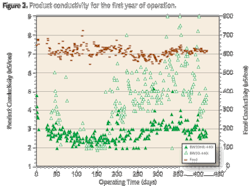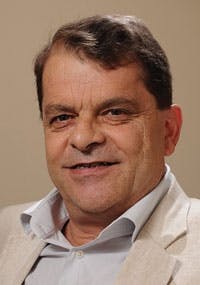Bright Business in the Black Sea
As American cultural anthropologist Margaret Mead once said, "Never doubt that a small group of thoughtful, committed, citizens can change the world. Indeed, it is the only thing that ever has."
The school of thought that change can be made at a community level is very much being applied to the Black Sea Region in Europe. With countries such as Romania, Bulgaria, Ukraine, Georgia and Turkey bordering this sea – one of the most isolated in the world – the region has failed in the past to grab the column inches, especially detailing its water infrastructure, of other European countries such as the UK, France and Germany.
It was in 2007 when Bulgaria and Romania joined the European Union that Black Sea countries were no longer seen as sitting on the periphery of Europe. The Eastern Partnership, launched in Spring 2009 and backed by the EU to the tune of €600 million, also helped bring the region into the main European spotlight.
Set out to "accelerate political association and further economic integration", the initiative was signed by representatives of the EU, Armenia, Azerbaijan, Belarus, Georgia, Moldova and Ukraine.
It is also sustainable development where the region could prove extremely important. Occupying a strategic position at the crossroads of Europe, Eastern Europe and Central Asia, the Black Sea region can be seen as a gateway between East and West.
Geography and population aside (the Danube–Black Sea Basin represents more than 160 million people), there is also the issue of funding.
The European Investment Bank (EIB) believes that major investment is needed in the region to help "remove nutrients and other pollutants from urban and industrial wastewaters".
"This is where the greatest reality test is – if you look at the many regions we're dealing with in the Balkans and beyond, you see a large part of the population living in very small settlements that have no realistic hope of establishing viable services on their own," says Stephen Hart, water sector expert at the EIB. "They therefore need to co–operate with each other or with a large town or at regional levels."
And it's not just attracting finance that is an issue preventing development in the region. Eutrophication, overfishing and pollution from land–based sources are all having an impact. This is leading to a decreasing quality of available water resources, as well as increased pollution levels.
But where there are challenges there are also solutions. One example is where GE Energy, Water & Process technologies, started working with one of Eastern Europe's largest ammonia fertliser producers to reduce fresh water intake and wastewater discharge fees. A desalination and water reuse solution was provided, comprising an integrated membrane system that combines ultrafiltration, reverse osmosis and electro–deionization technologies.
Is the Ukrainian example a good indication of other business opportunities in the Black Sea Region for water companies? Are there problems with establishing cross–boundary contracts in EU and non–EU countries?
Water & Wastewater International (WWi) caught up with Michel Murcusot, director of GE Energy, Water & Process technologies at the AER Black Sea Summit Black Sea Summit to find out more.
WWi: The Water Framework Directive (WFD) proposes that by 2015 countries should have achieved a "good" status in their river basins. In your opinion and experience is this achievable and are countries across Europe on track?
Michel Murcusot, director of GE Water Europe: 2015 is realistic but it requires a lot of work and political will. People are usually trying to drag their feet when they have to meet targets such as these, especially in times of economic crisis. What I think has to be done, besides the political activities and directives, is to have more campaigns to make people aware of the challenges ahead, what's important to do and more information on what can be done and how it can be done. I think that again legislation needs to be in place in most parts – investment can be populised. It's really a question of good will in my mind – people can achieve great things if they want.
WWi: Which countries in particular are progressing more than others when it comes to WFD targets?
MM: Water reuse is the big contributor to compliance and you may have seen in countries such as Spain, they are encouraging people to do more reuse, which is helping. France is in very good shape and Germany is the same. Countries that are really struggling a bit more are in Eastern Europe where the infrastructure is aging and there is work to be done.
WWi: One of the main drivers behind the WFD is the introduction of pricing to promote the sustainable use of water resources. Do you think the pricing structure across Europe has been implemented appropriately?
MM: Probably not. In some countries and most countries in Western Europe, the price of water is a fully loaded price. This is still highly subsidised in some countries and if the water price is subsidised then it makes the comparison with reuse not a fair comparison. True pricing is needed to move countries into a way of saving water, promoting reuse and this is not exactly the case everywhere.
WWi: On the subject of finance and specifically with the Black Sea region, we are talking about markets operating at different maturity levels. Do you think there should more funding and investment from the European Commission for the Black Sea region to develop its infrastructure?
MM: Financing is definitely difficult because of the reasons we have discussed. The price of water in most of these countries around the Black Seas is subsidised so it's difficult for private investors to justify their investment and get their money back. Private investment is definitively needed but this has to be done very selectively.
WWi: How much potential is there for companies mainly operating in Western Europe to bring their expertise eastwards to the Black Sea Region?
MM: It's definitely a business area and again private companies like ourselves and big players need to be confident that they will be playing in a field where the legislation is known and where the financing structures are possible. This is not in place everywhere but this is a market we are addressing.
We recently started a partnership in Turkey – a country where fresh water resources are scarce and unpredictable. Some years they have water and some they don't. Desalination on one side is a process we have to implement in the future, as well as water reuse. There is a strong literature base here and great potential to reuse existing water from cities. Again the market is difficult because sometimes there is a greater requirement for water than others. Therefore, there is the political decision which is difficult in a context where they might have to spend a significant amount of money and then they have a rainy season.
WWi: You mentioned it is easier working in countries where you have developed legislation. Around the Black Sea Region there is a minority of countries that are full members of the EU. Would it be easier for companies like GE if all countries in the region were part of the EU, to save dealing with different frameworks and governments?
MM: That would definitely help but I think awareness is the main starting point. Take the example of the fertiliser plant in Ukraine where people were not forced to do it, but they had a smart approach to overcoming their problem and they were committed. That is also very critical.
WWi: As the Black Sea Region develops, which type of water processing technologies and processes can we expect to see more of?
MM: I think that in the north a problem for countries concerns the division of existing fresh water resources. Take the Danube for example, the resources exist but they will probably have to make sure they have strong legislation in terms of wastewater treatment before discharging the water. In the south it's more about water scarcity so this is the main driver and desalination will play a big part.
WWi: How important a role will regional governments, at a local level, play in helping to develop infrastructure in the Black Sea region?
MM: The regional approach makes a lot of sense to me. There are a lot of differences in the nature of the programmes by region and when people try to address the problem from state level, they may not have the same pressures as the regions actually affected by these problems. State level [direction] is needed in most countries because that's the level where legislation comes from but public awareness in the regions that are more impacted can help. They will be able to address which states have more critical needs than others. I like this approach plus the fact that multiple regions from different states can get together and say "we have to deal with it".
WWI: The problem of eutrophication – the build up of organic matter – is well documented in the area. How will this impact on the operations of companies such as GE working in the area?
MM: We cannot do much about the problem of oil spills from tankers – it's a matter of making sure these ships are respecting the water. Another issue is agriculture and use of fertiliser that ends up in the sea. This source can only be repressed by controlling the use of fertilisers. Producing water from a sea that is polluted is more challenging and requires more sophisticated technology. The approach we are taking is helping to make drinking water safe from sources that may not be as safe as before. This is done by helping industries and municipalities not to discharge polluted effluent back into the sea.
More Water & WasteWater International Current Issue Articles
More Water & WasteWater International Archives Issue Articles



